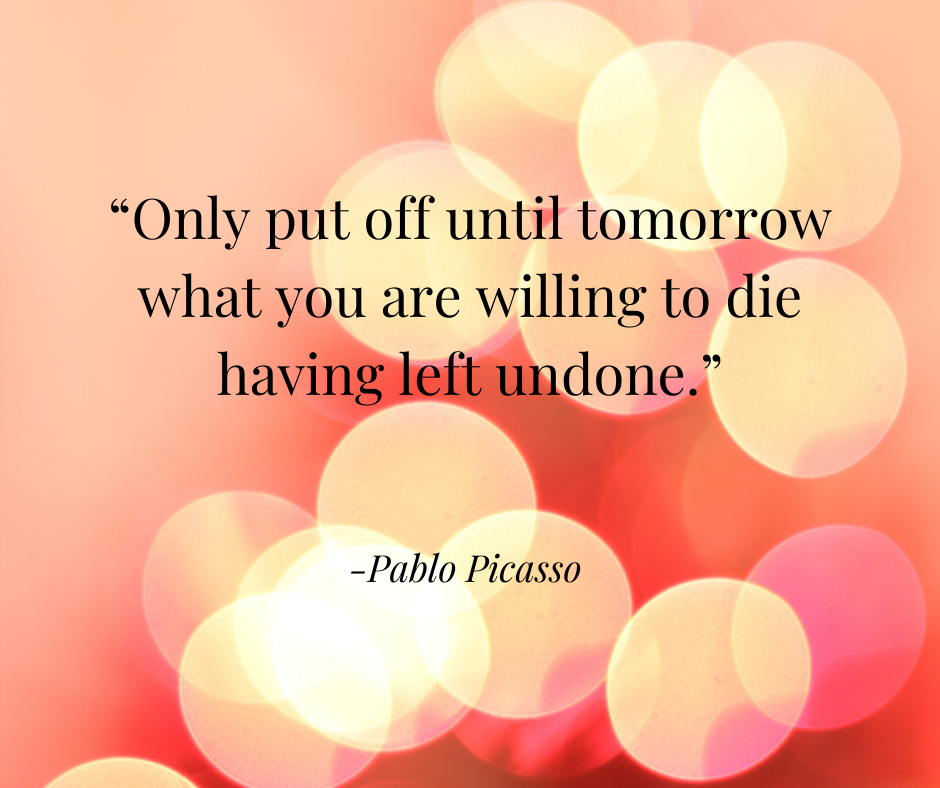Procrastination - Why do you postpone things?
What is procrastination?
Procrastination means deciding to delay or nor complete a task or a goal that you have already committed to, for no valid reason and doing something less important instead.
Procrastination is associated with words like “putting off”, “postponing”, “delaying”, “deferring”, and “leaving to the last minute”.
It can come with justifications and excuses for why we are not doing the task or going for a goal, and with replacement behaviors to occupy our mind and time.
Procrastination is a learned behavior and it can be changed.
Types of procrastination
Most of us procrastinate from time to time. And it is perfectly normal. This occurs for many reasons, but the main one is the fact that our brains are hardwired to avoid pain, suffering and discomfort and to look for pleasure.
But, 20% of people are chronic procrastinators. This can lead to negative consequences in their work performance, relationships, lives and well-being.
Procrastination has its roots in our way of thinking and feeling. The way we perceive the things we have to do, can lead to uncomfortable emotions and feelings about those tasks and goals, like anxiety, frustration, boredom, insecurity. Essentially, we want to avoid feeling bad or negative, so we end up procrastinating the task itself.
It is useful to get a more in-depth perspective about procrastination and understand how we can deal with this behaviour.
1. Avoidant procrastination
This type of procrastination is the one that appears more often, and it is closely related to fear of failure.
You avoid doing something because you fear the negative consequences that you might experience if you attempt to do it.
Some common thoughts that you can have when you use this procrastination:
"Why should I even try it?"
"I am not going to manage to do this, I am going to make a mess of things."
"I am sure I am not going to be able to do it well, finish it on time or do a good job."
"My boss and my colleagues will know that I underperformed and they will judge me and think negative things about me."
2. Thrill seeker procrastination
You use this type of procrastination because you enjoy the rush of adrenaline that you get from leaving things until the last moment. You like working in this time pressure and with a very close deadline.
You might think that you work better under pressure, that this is the only way in which you can actually focus and concentrate. You might also doubt your abilities to plan and organize your time and tasks, and your tolerance for discomfort might be very low.
3. Decisional procrastination
You keep postponing things because you don't want to make decisions, and you don't want to take responsibility for the consequences of those decisions. This can also be related to your confidence in your abilities to make decisions in general in your life.
Some common thoughts that you can have when you use this procrastination:
"Maybe it will solve itself out somehow."
"Maybe someone else will offer to do it and then they are responsible for what will happen."
"Maybe something will happen in my environment and I will not have to do the task at all."
Exercise - Self-Reflection
Why do you procrastinate?
In which category do you find yourself?
What kind of thoughts do you have before you start and while you procrastinate?
Strategies for your procrastination
Let yourself experience discomfort
Everyone experiences discomfort. And everyone can tolerate it, no matter how difficult it might seem.
Sit with the uncomfortable feelings that come up when you think of doing an unpleasant task. Recognize that these are just feelings. And they come and go.
Focus on the positive
At the end of your day, rather than focusing on the negative parts, purposefully move your attention towards what you actually managed to accomplish and what was positive in connection to your tasks and goals. Make a list of them and be as specific as possible.
Use practical strategies
If a task seems too overwhelming, complex or difficult, use some practical strategies to support you.
Split the task into small manageable components and focus on the first one to begin with
Make a goal of committing to a task for just 5 minutes. After the 5 minutes have passed, evaluate how you are doing and see if you can keep going
Offer yourself a small reward after you took positive steps towards a task in order to increase your motivation
Use cues: write your task on a post-it or make a reminder on your phone to help you remember the important things you want to do
Unplug from distractions - close the tabs you don't need, don't check your email and don't look at your phone for 30 minutes
Let’s Talk!
If you are noticing that it is hard for you to manage your procrastination, that it is negatively affecting your life and you are ready to start changing this behavior, get in touch. We can discuss your needs and goals and make a plan of how we can work together.


